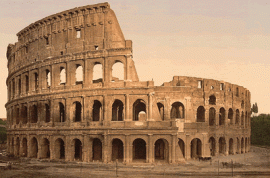
It’s taken me two days to get over watching Boris Johnson on the subject of the Roman empire before I could sit down to write a blog entry about it. Aside from a politician being given two hour long programmes to put forward his views of the European Union (when did a pro-EU campaigner get such a chance?) there is the tendentious argument that was put forward. (You can find some information about the TV programme here.)
The heart of the argument seems to be (we are only half way through, so things might change) that the Romans succeeded where the EU is failing because (1) they stuck to guaranteeing free trade rather than attempting any more extensive regulation and (2) they established the firm idea of citizenship and identity that bound the empire together. The EU goes too far in the first of these and not far enough in the second.
The obvious retort is that to go further in establishing the sense of identity would be to enact precisely the kind of regulation that goes beyond free trade. In some ways, the Roman empire was far more intrusive that the EU might ever be. The economic resources of the empire were taxed quite heavily in order to pay for the city of Rome. There is no comparison here with the EU. The only thing that the two have in common is geography.
I have written elsewhere on this site about my attitude to theories: it is not a question of whether they are right or wrong but of whether they are useful. An attempt to interpret the EU by reference to ancient Rome fails this consideration utterly.
It would be much more interesting to compare the EU with modern-day integration processes that depend on consent. The United States might be one such example, the unification of Italy, perhaps, is another. There will be others, too, that make much better comparisons with the European Union. You would also get the travelogue sections, still, and some interesting experts to get quotes from. All we need is a floppy-haired Europhile to act as presenter. Any suggestions?
